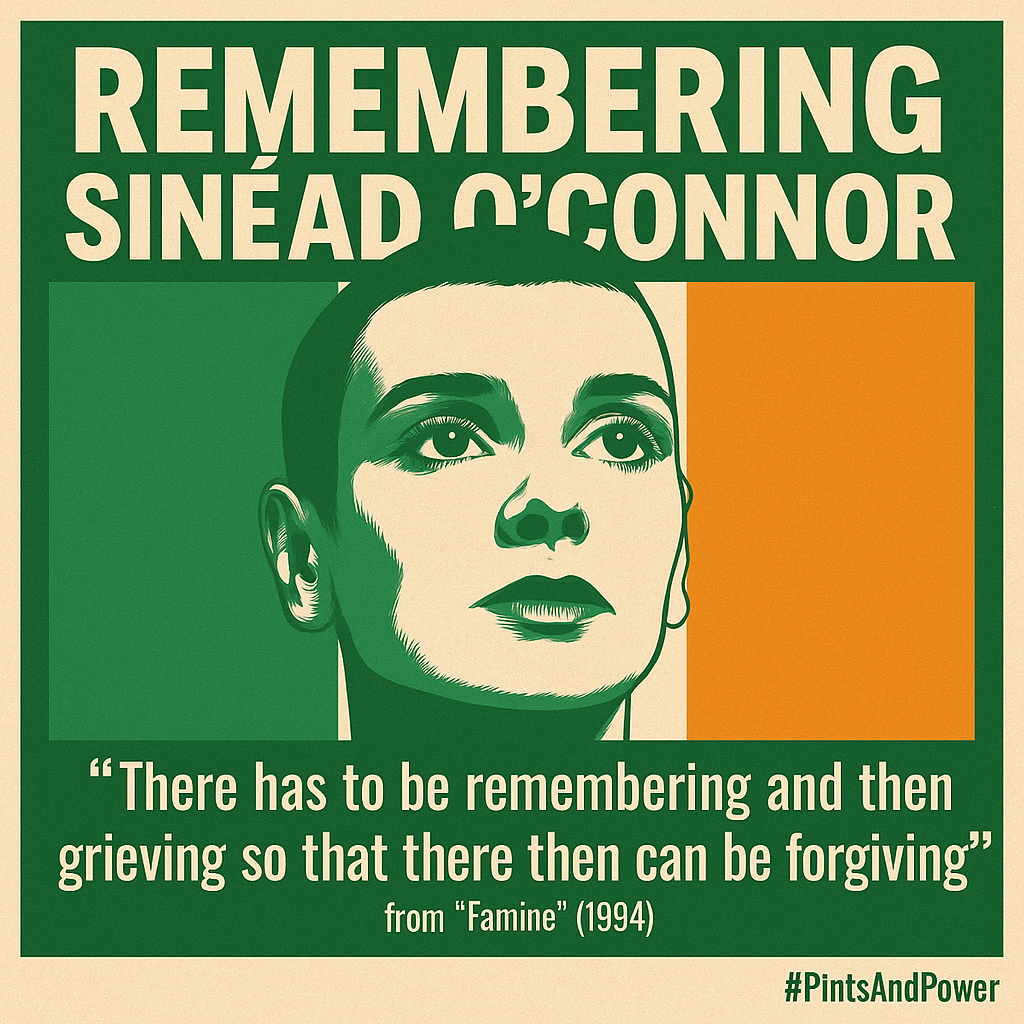Sinéad O’Connor, the Great Hunger, and Irish Memory
Remembering Sinéad O’Connor—and how “Famine” reframed the Great Hunger as truth, grief, and a ritual of remembering that still matters.

Today is for remembering Sinéad O’Connor—not only the force of her voice, but the way she refused easy stories. In “Famine,” she pulled Ireland’s Great Hunger out of polite silence and into the open, insisting that history isn’t healed by moving on—it’s healed by telling the truth.
Among her most powerful pieces is the 1994 track Famine. A spoken-word blend of history, hip-hop, and heartache, it pierced through decades of silence surrounding one of Ireland’s deepest scars: what we now call the Great Hunger.
“But if there ever is gonna be healing
There has to be remembering and then grieving
So that there then can be forgiving
There has to be knowledge and understanding.”
That’s the heartbeat of the song. Not rage for its own sake. Not a rewriting of history, but a reclaiming of it—so that we might move forward.
In Pints and Power, I make a deliberate choice: I refer to that era not as “The Great Famine,” but as “The Great Hunger.” Because it was never just about the failure of the potato crop. It was about policy. Power. Priorities. Food kept flowing out of Ireland while her people died or fled. The hunger wasn’t only in the body—it was in the soul.
Guinness, during that time, kept brewing. It didn’t cause the hunger—but it didn’t pause for it either. As I write in the book, the brewery grew, while the country hollowed. It endured—but its endurance, like so many institutions of the time, came with silence.
Sinéad broke that silence.
She gave language to a grief that had been inherited but not always understood. She didn’t sing to shame the past. She sang so that the future could be different.
“How come there's so much food in Ireland, yet people are still hungry?”
Her conviction was constant—from her live SNL protest calling out abuse in the Catholic Church, to songs like Famine that held Ireland’s own history up to the light. She was never singing for applause. She was offering truth. And her legacy is not just the voice we hear—it is the voice we are forced to feel.
Read the full lyrics on Genius
Let it play. Let it rise. Let it make space.
In an Irish American History workshop, historian Davy Holden pointed out that the British government publicly declared the famine “over” in 1847. But as he emphasized, 1847 was in fact the worst year of all—the height of starvation, disease, and mass emigration. That disconnect between official narrative and lived reality is exactly the kind of silence Sinéad O’Connor refused to let stand. Her song Famine doesn’t just recall history—it reclaims it from the hands of those who were too eager to move on.
In sharing early chapters of Pints and Power with family, my wife’s Uncle Butch—an Irish American with deep ancestral pride—paused while reading aloud. Not for the pour to settle, but for his eyes to clear. Later, he told me how much it meant to see the story framed not as “famine,” but as the Great Hunger. It stirred something deep in him—spiritual, generational. That’s the same current Sinéad tapped into with Famine: a memory that still lives in the bones of those descended from it, and a story that still needs space to grieve before it can forgive.
Sinéad never railed against ritual itself. Her fight was with the forces that buried the truth beneath it. She wasn’t challenging the symbols of Irishness—but demanding they be honest. That’s the standard she set—and it’s one we honor in every remembered pour.
Raise a glass if you will—but let it be one of remembrance, of presence, of future peace. Because as Pints and Power explores, the pour only matters if we understand what’s beneath it. And Sinéad asked us to do just that.
To remember.
To grieve.
To forgive.
To begin again—honestly, and without fear.
—Mike





Comments ()